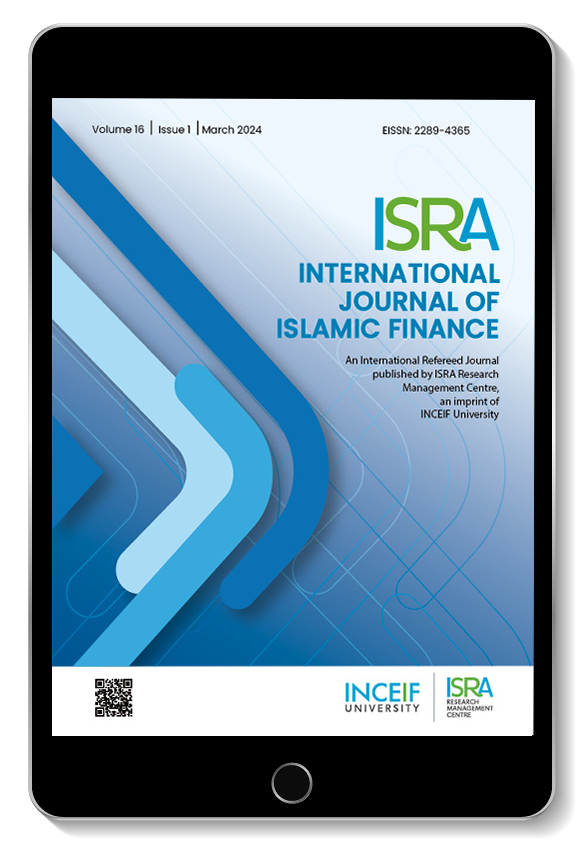伊斯兰小额信贷在赋予妇女权力方面的作用:来自伊斯兰银行孟加拉国有限公司农村发展计划的证据
IF 1.4
Q2 BUSINESS, FINANCE
引用次数: 21
摘要
目的本研究的目的是调查伊斯兰小额信贷服务(IMFS)对孟加拉国农村妇女赋权的影响。设计/方法/方法本研究基于多阶段抽样技术。主要数据是通过对389名接受过孟加拉国伊斯兰银行有限公司IMFS的女性受访者进行的面对面调查收集的。Cronbachα检验是为了检验所收集数据的可靠性和内部一致性。采用配对样本检验、logit回归和比例假设检验来衡量IMFS对妇女赋权的影响。描述性统计和推断性统计被用来解释数据。研究结果表明,IMFS导致了受访者家庭从农业到零售业的职业动态的结构性转变。IMFS对家庭收入、储蓄和支出产生了重大的积极影响;提高了生活水平和人力资本形成;并加强了赋权的所有三个层面,即经济赋权、社会文化赋权和家庭赋权。其中,ECEM和SCEM对妇女的整体赋权做出了积极贡献,而FLEM对整体赋权产生了负面但微不足道的影响。受访者的看法也支持这一发现,即IMFS使农村妇女受益并赋予她们权力。原创性/价值该研究基于原始数据。它引发了一场关于女性在家庭事务中是否占主导地位的调查。如果是这样的话,它可能会降低幸福感和整体女性赋权。关于这一调查的现有文献中存在明显的空白。本文章由计算机程序翻译,如有差异,请以英文原文为准。
Role of Islamic microfinance in women’s empowerment: evidence from Rural Development Scheme of Islami Bank Bangladesh Limited
Purpose
The purpose of this study is to investigate the impact of Islamic microfinance services (IMFS) on women’s empowerment in rural Bangladesh.
Design/methodology/approach
The study is based on a multi-stage sampling technique. The primary data are collected through a face-to-face survey of 389 women respondents who have received IMFS from the Islami Bank Bangladesh Limited. Cronbach’s alpha test is conducted to test the reliability and internal consistency of collected data. Paired-sample tests, logit regression and proportion hypothesis tests are conducted to measure the impact of IMFS on women’s empowerment. Descriptive and inferential statistics are used to interpret the data.
Findings
The study reveals that IMFS have led to structural transformation in the occupation dynamics of the respondents’ families from agriculture to retail businesses. IMFS have had a significant positive impact on household income, savings and expenditure; have improved standard of living and human capital formation; and have enhanced all three dimensions of empowerment, namely, economic empowerment (ECEM), socio-cultural empowerment (SCEM) and familial empowerment (FLEM). Of them, ECEM and SCEM have positively contributed toward overall women’s empowerment, while FLEM has a negative but insignificant impact on overall empowerment. The respondents’ perception also supports the finding that IMFS have benefited rural women and empowered them.
Originality/value
The study is based on primary data. It leads to an inquiry as to whether women are dominant in familial affairs. If so, it may reduce the state of happiness and overall women’s empowerment. There is a clear gap in the existing literature about this inquiry.
求助全文
通过发布文献求助,成功后即可免费获取论文全文。
去求助
来源期刊

ISRA International Journal of Islamic Finance
BUSINESS, FINANCE-
CiteScore
3.40
自引率
17.40%
发文量
18
审稿时长
20 weeks
期刊介绍:
It is the aspiration of the editorial committee that IJIF achieves the highest rank in quality and substance. It is thus our aim that the journal be carried in the Thompson Reuters’ ISI and Scopus databases. By ensuring high standards in articles published in Islamic finance we ensure that further innovation and research is carried out and promoted in the Islamic finance industry and academia. IJIF publishes 2 issues per annum.
 求助内容:
求助内容: 应助结果提醒方式:
应助结果提醒方式:


